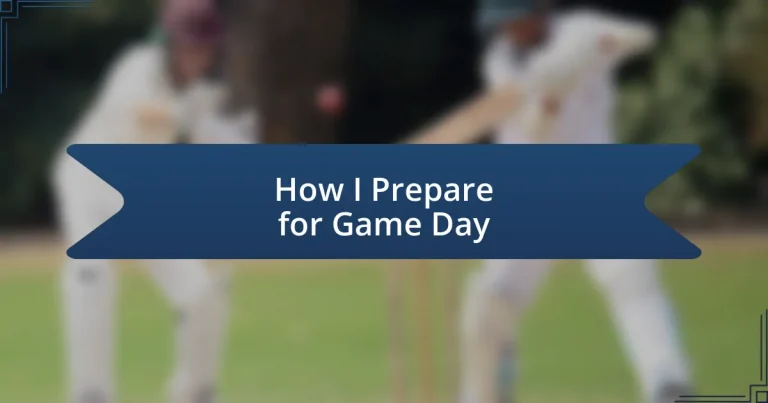Key takeaways:
- Game Day embodies the culmination of preparation, emotion, and personal growth, shaping character and resilience.
- Establishing a Pre-Game Schedule enhances focus, ensuring proper physical and mental preparation, while incorporating buffer time for unpredictability.
- Nutritional intake and hydration are crucial for maintaining energy and mental clarity on game day.
- Post-Game reflection and discussion with teammates foster learning and continuous improvement in performance.
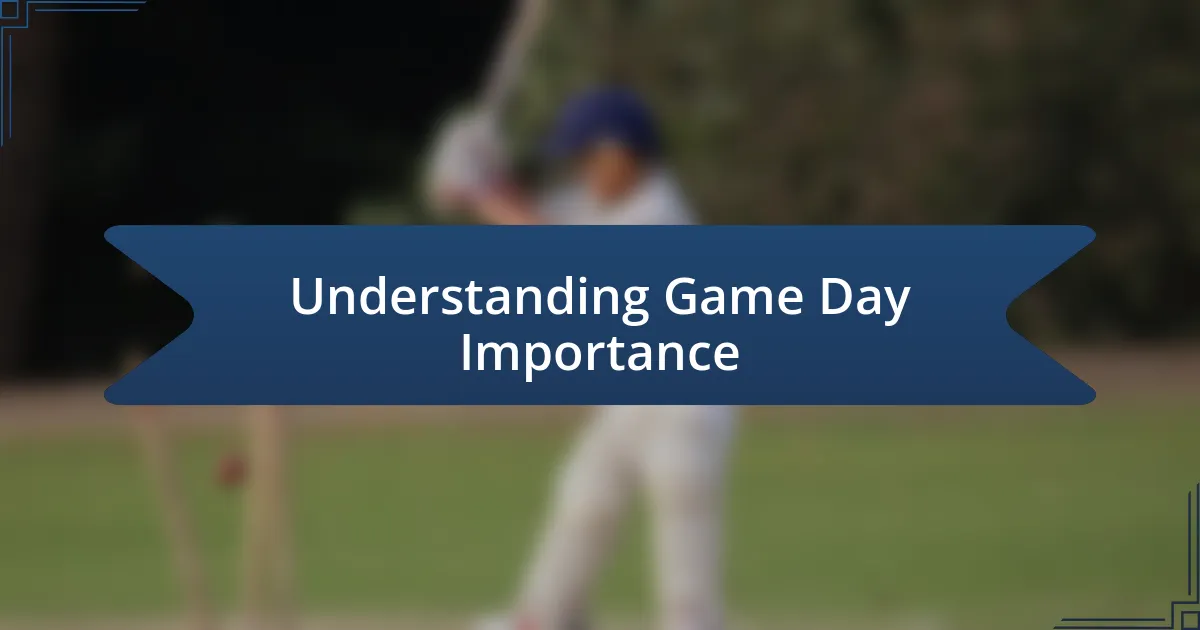
Understanding Game Day Importance
Game Day is more than just a day on the calendar; it encapsulates months of hard work, dedication, and anticipation. I remember the exhilaration of stepping onto the field, knowing that every practice had led to this moment. The atmosphere is electric, and I can feel the adrenaline coursing through my veins—it’s this unique blend of excitement and pressure that highlights the importance of game day.
Let’s be honest, how often do we get the chance to showcase our skills in front of an audience? For me, that feeling of being in the spotlight is both thrilling and nerve-wracking. It’s a time when teamwork and individual prowess converge, and I find myself reflecting on the sleepless nights spent perfecting my game. Each moment feels monumental, and the stakes are higher than usual, creating a pressure that can either elevate performance or lead to second-guessing.
What truly sets Game Day apart is the culmination of emotions and experiences that it brings. I’ve often pondered why it feels so pivotal—perhaps it’s because these moments shape our character and resilience. Win or lose, the lessons learned resonate long after the final whistle, reinforcing the idea that every game is an opportunity for growth and reflection.
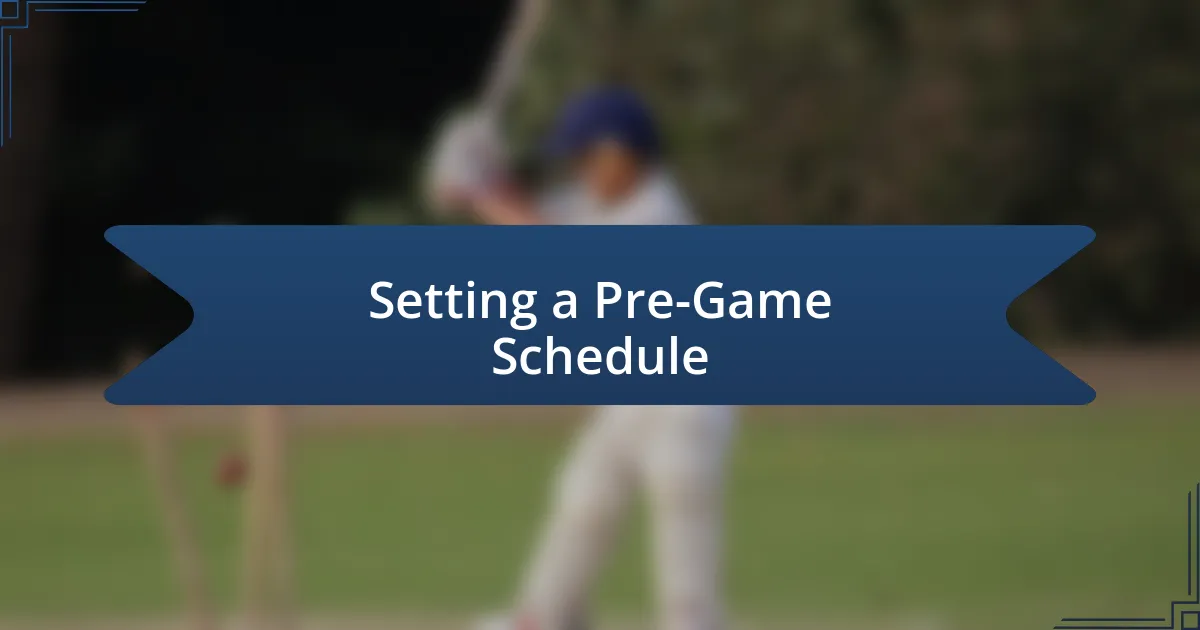
Setting a Pre-Game Schedule
Setting a Pre-Game Schedule is crucial to ensuring that everything flows smoothly on the big day. In my experience, I always start with a detailed timeline that maps out when to wake up, eat, and arrive at the venue. The first time I underestimated the time needed to warm up, I ended up feeling rushed and out of sync. Now I prioritize those moments before the game to not only prepare physically but to also calm my mind.
As I lay out my schedule, I often allocate time for both physical and mental preparation. For example, I set aside at least 30 minutes for stretching and a light workout to get the blood flowing. This is essential for getting into the right headspace. Additionally, I make sure to carve out a few minutes for visualization. Imagining each play and my performance really helps focus my mindset. Have you noticed how sometimes just thinking through your moves can give you an edge? It’s a simple technique, but it pays off big time.
Lastly, I always include buffer time in my schedule. Life is unpredictable—traffic could delay me, or I might need extra time to get into the right emotional state. I remember once when a minor hiccup resulted in me feeling unprepared. Now, I plan for those surprises to keep stress levels low. Having a flexible but structured plan allows me to adapt while staying focused.
| Schedule Item | Time Allocation |
|---|---|
| Wake Up | 6:30 AM |
| Breakfast | 7:00 AM |
| Warm-Up | 7:30 AM |
| Mental Preparation | 8:00 AM |
| Buffer Time | 8:30 AM |

Selecting the Right Equipment
Selecting the right equipment is a vital part of my game-day routine, and I always take the time to ensure I have everything in order. One game day, I showed up with a pair of shoes that were just a little too worn down. By halftime, I could feel the impact of those extra miles on my feet, and it definitely affected my performance. Now, I make a thorough checklist ahead of time to avoid any surprises and ensure everything is ready to go.
Here’s a list of what I focus on when selecting my game-day equipment:
- Footwear: Always check for proper fit and support; comfort can make or break your game.
- Clothing: Choose breathable, moisture-wicking fabric to stay cool under pressure.
- Protective Gear: Make sure you have the right pads or guards; they’re essential for safety and confidence.
- Accessories: Don’t forget items like gloves, a headband, or a water bottle to keep you hydrated.
- Backup Gear: I always bring an extra jersey and socks; you never know when something might get damaged or dirty.
By paying attention to these details, I can focus entirely on my performance, knowing I have everything I need at my fingertips.

Fueling Up with Nutrition
Fueling up with nutrition on game day isn’t just important; it’s essential for peak performance. I remember a match where I neglected to eat breakfast. I felt sluggish and unfocused as the game progressed, and it was frustrating to realize how my lack of proper fuel held me back. Now, I prioritize a balanced meal with plenty of carbs and proteins to keep my energy levels high.
I usually opt for oatmeal topped with fruits or a whole-grain toast with eggs. This combination provides sustained energy without that dreaded crash. It’s fascinating how the right foods can influence your mental clarity and endurance. Have you ever noticed how good you feel after eating a nutritious meal? I certainly have, and that’s why I never skip it on game day.
Hydration plays a crucial role in my pre-game ritual as well. I’ve learned the hard way that being even slightly dehydrated can impact my stamina. Before a game, I make sure to drink water consistently throughout the day. Staying hydrated helps me maintain focus and agility when it counts the most, ensuring I’m at the top of my game.
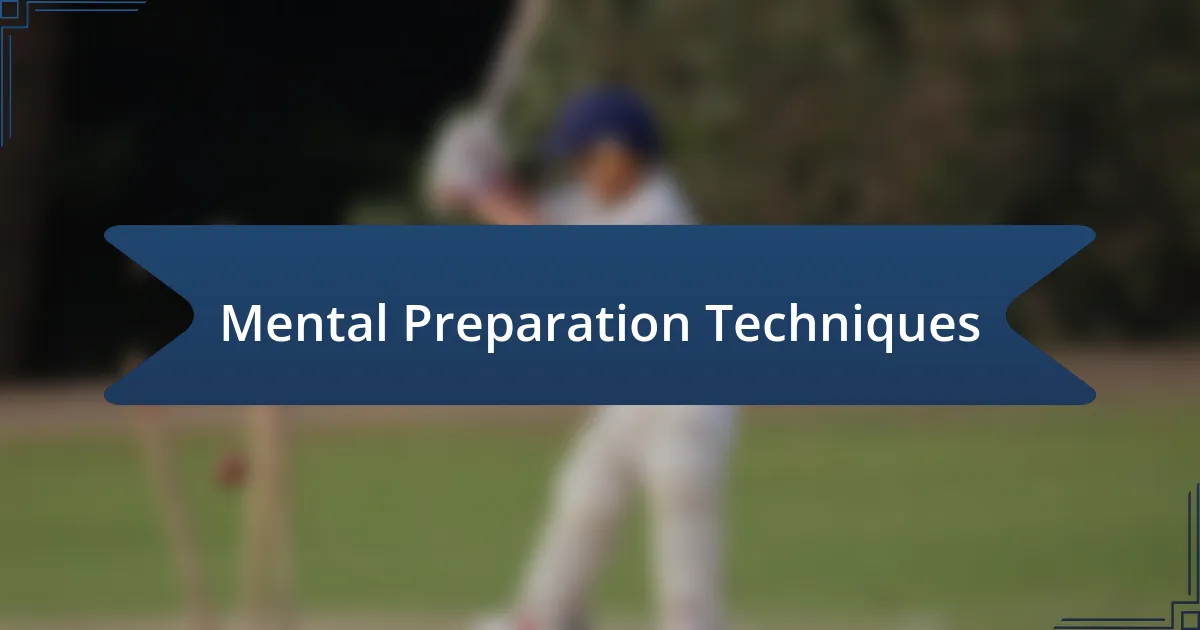
Mental Preparation Techniques
Mental preparation is just as vital as physical conditioning. One technique I find particularly effective is visualization. Before the game, I often close my eyes and mentally walk through the plays I plan to execute. Visualizing myself successfully making that game-winning shot or tackle not only boosts my confidence but also calms my nerves. Have you ever tried picturing your success in advance? It’s almost like a rehearsal for the real thing.
Another approach I use is mindfulness meditation. On the day of a big game, I take a few minutes to sit quietly and focus on my breath. This practice centers me and helps reduce any anxiety I might feel. I’ve noticed that when I’m more present in the moment, I perform better. Have you noticed a difference in your focus when you take time to clear your mind? It’s genuinely transformative.
Journaling has also become a crucial component of my mental prep. I take some time to jot down my thoughts, feelings, and even my expectations for the game. Reflecting on my experiences helps me to process my emotions and set a positive mindset. It creates a clear path for how I want to approach the game. Have you ever thought about writing your fears or aspirations down? You might be surprised at how it helps clarify your intentions and reduce pre-game jitters.
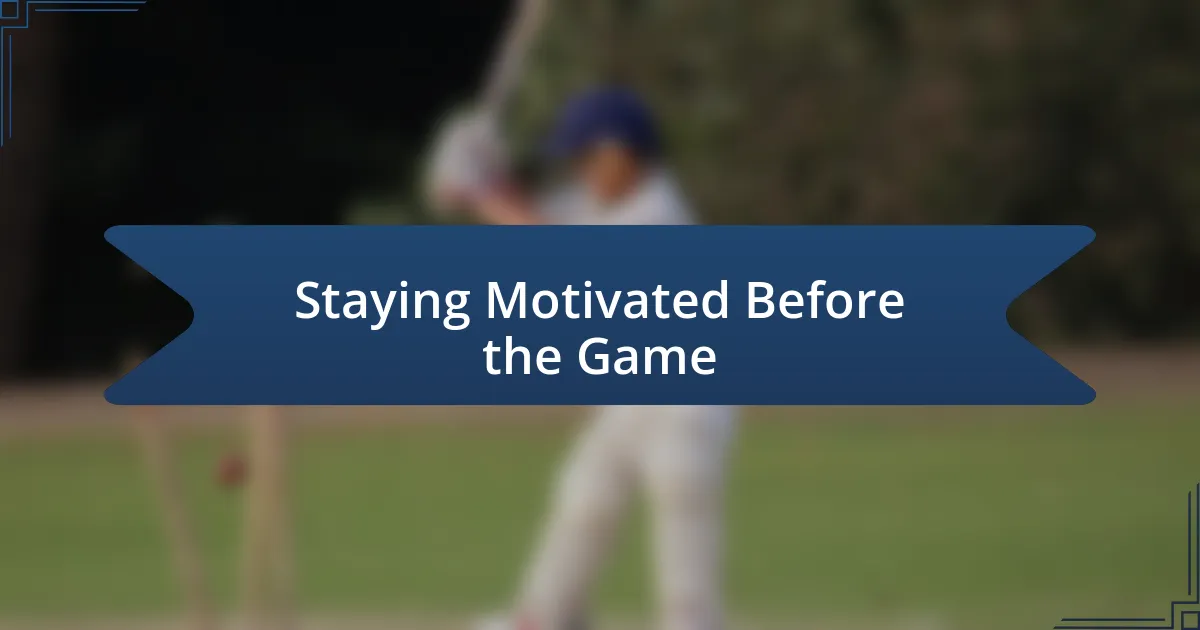
Staying Motivated Before the Game
When it comes to staying motivated before the game, I find that setting specific goals is incredibly helpful. I remember a time when I aimed to make three perfect passes during practice. That little goal shifted my focus from the overall game pressure to an achievable task. How do you break down your motivations? Sometimes, it’s just about small victories leading up to the big day.
Listening to music also plays a major role in my pre-game routine. I create a playlist filled with songs that pump me up and put me in the right headspace. The right tune can elevate my mood and energy levels in a matter of seconds. Do you have favorite songs that get you fired up? Music has this magical ability to connect with our emotions and switch our mindset from nervousness to fierce determination.
Engaging with teammates before the game really amplifies my motivation. I recall a moment before a championship match where we huddled together, sharing our excitement and intentions. Those brief conversations lifted my spirits and reminded me that we were in this together. Isn’t it reassuring to have a support system in place, especially on game day? It reinforces that sense of camaraderie and shared purpose, reminding me that we’re all aiming for the same goal.

Post-Game Reflection and Analysis
Reflecting on the game afterward is essential for my growth. I take time to sit quietly and replay the moments in my mind, analyzing what worked and what didn’t. It’s fascinating how one specific play can lead to an “aha” moment about strategy or teamwork—have you ever experienced that clarity after a game?
Sometimes, I jot down my thoughts in a journal. This practice allows me to articulate my feelings and recognize patterns over time. I remember after a tough loss, writing about how our communication faltered. That seemed to resonate deeply, motivating me to work on it for our next match. Have you ever discovered insights through writing?
Engaging in post-game discussions with my teammates is invaluable. I cherish those moments when we deconstruct our performance together; it fosters a team culture of continuous improvement. I recall a match where we celebrated our successes but also recognized areas for our collective growth. How do you encourage this type of dialogue within your team? It reinforces our bond and cultivates an environment where everyone feels invested in our journey.
